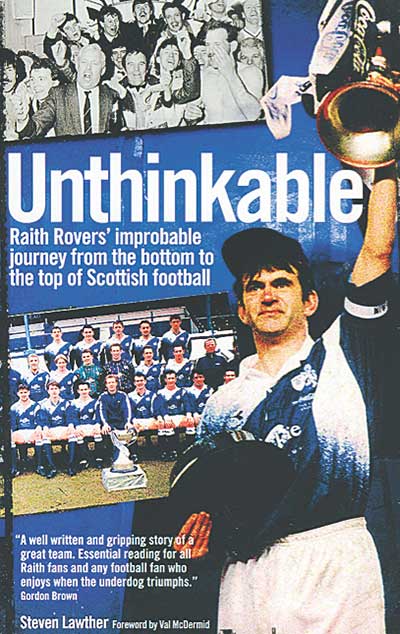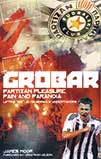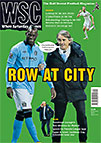 Raith Rovers’ improbable journey from the bottom to the top of Scottish football
Raith Rovers’ improbable journey from the bottom to the top of Scottish football
by Steven Lawther
Pitch Publishing, £14.99
Reviewed by Gavin Saxton
From WSC 334 December 2014
In November 1994, Raith Rovers beat Celtic in the League Cup final to win the first and only major trophy of the club’s history. This book commemorates the 20th anniversary and charts the club’s progress to Hampden from their low-point as a third-tier part-time team in the mid-1980s, via interviews with many of the players and backroom staff.
It’s a feelgood story, but while there might have been a danger of veering into cliche (there is much talk of “team spirit”) you are instead carried along by the enthusiasm of both the author and his interviewees. Because this was not just a special day for the fans, for so many of the players too it was their professional highlight. Dave Narey and manager Jimmy Nicholl had more illustrious playing days behind them (notably with Dundee United and Manchester United respectively) and youngsters such as Colin Cameron and Steve Crawford had good international careers to come. The rest of the squad, however, was a mishmash of local lads, rejects and journeymen, who came together to give the club the finest period in their history: they won the cup as a Division One side, but were also to go on and take the league title. Their UEFA Cup campaign the following season (although not covered here) gave them a tie against Bayern Munich, during which they led 1-0 in the Olympic Stadium at half time before losing 4-1 on aggregate. Accordingly almost all of the squad have been happy to talk, and author Steven Lawther succeeds by, for the most part, allowing them to tell the story, intervening only to provide linking narrative and fill in the necessary detail.
The stories include the bad days as well as the great ones, some entertaining insights into the minds of middle-ranking footballers – such as Gordon Dalziel’s efforts to avoid having to work too hard in a training session – and of course all the on-field heroics. Among the most improbable is the tale of Brian Potter, the 17-year-old goalkeeper who came on as sub after Scott Thomson’s red card and made the vital save to win the penalty shootout in the semi-final against Airdrie.
In the final Thomson himself became the hero, again in a penalty shootout after a late equaliser gave Rovers a well-earned 2-2 draw. Celtic captain Paul McStay was the man whose penalty Thomson saved (the book’s title comes from Jock Brown’s TV commentary at the time: “Unthinkable surely for the skipper to miss”), and McStay deserves huge credit for putting the bad memories aside and also allowing himself to be interviewed.
For those like myself who were following Raith at the time the book brings back wonderful memories. But for others too, it’s a great story and an evocation of a time when lower-league clubs could have such days in the sun. As the game in both England and Scotland polarises all the more between haves and have-nots, one suspects it’s a tale that, just two decades on, would now be impossible. Unthinkable, even.
 Partizan pleasure, pain and paranoia
Partizan pleasure, pain and paranoia by Rafa Benítez
by Rafa Benítez Calls for a trial of new safe standing technology in the top two tiers are slowly starting to gather political support,
Calls for a trial of new safe standing technology in the top two tiers are slowly starting to gather political support,